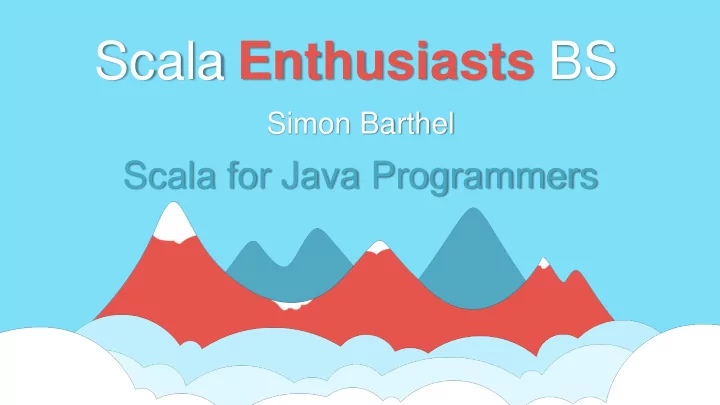

Scala Enthusiasts BS Simon Barthel Scala for Java Programmers
Scala = „scalable language“ 2
Martin Odersky • Computer Scientist and Professor of programming methods • Important Projects: • Modula2, Pizza, Generic Java, current version of javac, and of course Scala • 2001: Development of Scala • 2004: First version • 2011: Foundation of Typesafe 3
Scala • Combining worlds of OO and functional paradigms • Strongly typed • Running in the JVM 4
Yet another language? New Frameworks 5
Scala is a JVM Language • For the start just use your Java experience! • E.g. use Maven-Scala-plugin and start using Scala right now! • Learn some awesome new Scala features when you have time • Just switch back to Java when you have to be productive • Smoothly learn Scala over time 6
Variables • Introduce new field/variable with var • Type and identifier switch positions • For generic types put type in [squared brackets] int i = 5; String s = "Hello World"; Collection<Double> l = new ArrayList<Double>(); var i: Int = 5; var s: String = "Hello World"; var l: Collection[Double] = new ArrayList[Double](); 7
Functions • Introduce new method/function with def • Type comes after the parameter list • Add an ‘=‘ before the curly braces public String firstNChars(String s, int n) { return s.substring(0, n); } def firstNChars(s: String, n: Int): String = { return s.substring(0, n); } 8
For-loop • For-loops only iterate over iterable objects • Like Javas extended for-loop • 0 to 100 creates a Range from 0 to 100 for ( int i=0; i<100; i++) { System.out.println(i); } for (i <- 0 to 100) { System.out.println(i); } 9
Try-Catch • Catch-Block is now a Partial Function • To be introduced later try { ... } catch (IOException ioe) { ... } catch (SQLException se) { ... } try { ... } catch { case ioe: IOException => { ... } case se: SQLException => { ... } } 10
Hello World! public class Main { public static void main(String[] args) { System.out.println("Hello World"); } } object Main { def main(args: Array[String]): Unit = { System.out.println("Hello World"); } } 11
Classes object Person { abstract class Person { var numArms: Int = 2; public static int } numArms = 2; public String name; abstract class Person( public Person(String name) { var name: String this .name = name; ) { } def eatBreakfest(): Unit; public abstract void } eatBreakfest(); } 12
Interfaces • Interfaces are now called traits • Apart from that the aforementioned rules apply interface AcademicPerson { public String getDegree(); } trait AcademicPerson { def getDegree(): String; } 13
Inheritance class Bachelor extends Person implements AcademicPerson { public Bachelor(String name) { super (name); } @Override public void eatBreakfest() { System.out.println("nomnomnom"); } @Override public String getDegree() { return "graduate"; } } 14
Inheritance class Bachelor(name: String) extends Person(name) with AcademicPerson { override def eatBreakfest(): Unit = { System.out.println("nomnomnom") } override def getDegree(): String = { return "graduate"; } } 15
Scala-Maven-Plugin • Start coding Scala in your current Java Project! • I show you how • Look up instructions at: • https://github.com/scala-bs/ meeting-1-MavenWithScalaAndJavaSources 16
Recommend
More recommend